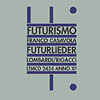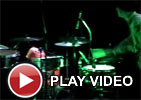Franco Casavola, "Futurlieder"
 Futurism may have lost some of its futuristic appeal in the 100 or so years since its birth. That the works of a Futurist composer from the 1920s could sound so fresh may come as a surprise. Franco Casavola's compositions have little relation to the noisier side this movement is perhaps more famous for and that it does sound so fresh might be a testament to what Futurism stood for in the first place.
Futurism may have lost some of its futuristic appeal in the 100 or so years since its birth. That the works of a Futurist composer from the 1920s could sound so fresh may come as a surprise. Franco Casavola's compositions have little relation to the noisier side this movement is perhaps more famous for and that it does sound so fresh might be a testament to what Futurism stood for in the first place.
LTM
As fascinated as I am by early electronic music and by the use of noise as a musical element in any composition, the theories and conceptual framework developed by Filippo Tommaso Marinetti at the beginning of the 20th century never drew me firmly into the fold of Futurist thinking or electronic music. That it was almost undoubtedly tied to fascist politics also served to distance me from its machinations. The movement has undoubtedly influenced ensuing generations of artists and musicians, though. Just take a look at the cover for this album and the cover of New Order's Movement and the causal chain should become absolutely apparent (not to mention the robotic costumes that have been employed by various surrealist and dadaist innovators alike, all from the forward-looking artists of the Futurist era).
Franco Casavola represents a musically reserved and, dare I say, more classical approach to music: the Futurism in his work, though I am incapable of understanding Italian, must lay somewhere in the poetry and lyrics that make up much of this disc. Daniele Lombardi and Susanna Rigacci were employed to perform what were thought to be lost compositions from this Futurist-turned-anti-Futurist composer. Composed entirely of piano and Riggaci's lovely soprano voice, Futurlieder is a collection of different song cycles, advertising jingles (supposedly for Campari), cabaret pieces, and lyrical songs. Surprisingly, these are all pieces where the "experimental" aspects of the compositions are lost in the gentle wandering of idyllic piano and the powerful flow of high voices throughout. To my ears, anyone who can enjoy the pleasant talent of operatic performers and the simple ease of relaxing, solo piano pieces will enjoy this. I am by no means an expert of classical forms, styles, or theory, but this music is soft, gentle, and enjoyable in every aspect.
Casavola's real genius, then, would stem from his ability to write songs that have survived time just as well as the best classical composers. Unfortunately for supporters of Futurist ideals, that would mean any great composer of any era was Futurist in some sense, writing music resilient enough to survive long periods of times and severe changes in musical consciousness. Everything from his "Tango Viola da 'Cabaret Epilettico'" (a tango for an "Epileptic Cabaret") to his Tankas cycle is resonant with a playfulness that feels current and vibrant, alive despite its age. His poetic approach to topics, such as on his La Sera ("Evening") cycles, is always appropriate and harmonious, the concept matching the music superbly.
The liner notes provided by LTM are excellent, providing a competent, informative, and brief account of the composers life, works, and influences. An account of Casavola's literary work is also provided for anyone interested in the conventions and ideals he subscribed to. LTM's website contains a complete list of the music included on this disc as well as biographical information about this composer.
samples:



